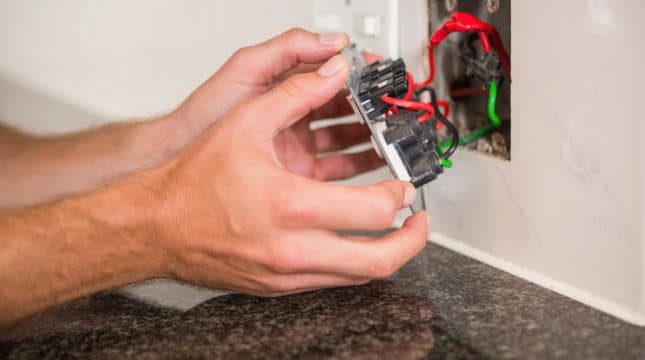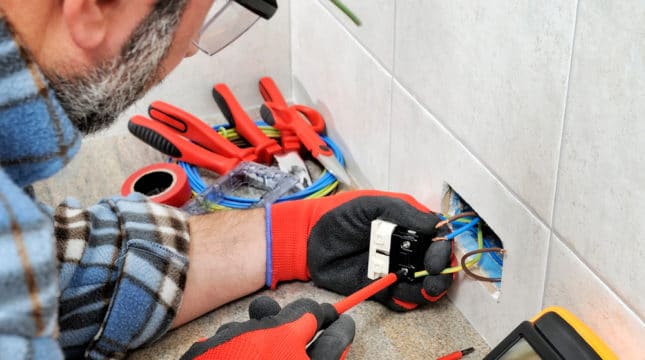Do you need an Ohio electrical license to do electrical work?
Yes and no. If you work on commercial jobs, you need a license to be an electrical contractor in Ohio. The Ohio Construction Industry Licensing Board (OCILB) only issues state licenses for commercial electrical contractors — no journeyman or master electrician licenses.
Local municipalities may have different requirements, so it’s wise to check the area where you plan to work. For instance, in Middletown you must have at least three years of apprenticeship experience and technical instruction to apply for a journeyman electrician license. In Hamilton, you must be a master electrician to register for work permits.
Other municipalities allow working under a licensed contractor electrician for five years before applying for an electrician contractor license.
Insurance requirements for an Ohio electrical license
Ohio requires liability insurance, but you can consider more holistic electrician insurance coverage. Your insurance requirements and needs can vary depending on whether you’re self-employed, have employees or more.
Workers’ Compensation insurance
In Ohio, all employers need to have workers’ compensation insurance. However, unlike other states, the Buckeye State is monopolistic, meaning business owners must purchase insurance from the Ohio Bureau of Workers’ Compensation (BWC).
This insurance helps cover workplace injuries for employees, medical expenses and other related costs, including lost wages and retraining in more severe cases.
When workers’ comp is purchased through the state fund, it doesn’t include employer liability insurance, which helps pay for claims involving employee injuries. Ohio businesses can purchase this protection as stop-gap coverage from a private insurer.
Learn more about workers’ compensation for contractors.
General Liability insurance
The Ohio Construction Industry Licensing Board requires general liability insurance to hold a license in Ohio. You must have $500,000 in coverage.
General liability insurance helps cover you for non-employee accidents, such as causing an injury or damage to a client’s property.
Learn more about general liability insurance for contractors.
Commercial Property insurance
If you’re running your business out of a commercial space (rent or own), you will need commercial property insurance. It helps cover your physical structure, inventory and equipment from covered events, such as fires or theft.
Business Owner’s Policy
A business owner’s policy, or BOP insurance, provides broad coverage of general liability and commercial property policies combined in a single, cost-efficient bundle. It can help cover damage that you or your employees may accidentally cause to another person’s property and help protect your business equipment in the event of a fire or other covered event.
Tools and Equipment insurance
Many electricians work out of their trucks, storing tools and equipment on the go. Tools and equipment insurance helps with repair and replacement coverage for work gear. It can even cover lost or stolen items.
Commercial Auto insurance
You will need commercial auto insurance if you drive a vehicle as an electrician. This insurance helps cover accident-related costs like towing and repairs for business vehicles.
How to get an electrician license in Ohio
You must fulfill the following Ohio electrical license requirements before applying:
- Be at least 18 years old
- Be a US citizen or a legal and documented alien who can work
- Not be a convicted felon or been convicted of an offense (according to H.B. 263)
- Pass the electrician exam
- Pass a background check
- Carry a minimum of $500,000 contractor liability insurance
- Pay appropriate application fees
Once your application has been approved, you are required to complete a state and federal background check and can sit for the electrical exam.
Required work experience
Additionally, you will need to fulfill the requirements for electrical work experience. You can either:
- Have five years of consecutive experience working in the electrical trade before applying for the license. You must have worked under a licensed electrician.
- Be currently registered as an engineer in the state of Ohio and have at least three years of business experience in the construction industry as an electrician.
You will need to pass an exam in both these cases.
Take the licensing exam
After the Board approves your application and background check, you’ll get instructions for scheduling your licensure exam. PSI administers the exams via computer-based testing at various venues across the state. The open-book exam has two parts:
- Electrician contractor examination: four hours.
- Ohio contractor business and law exam: two hours.
It costs $138 to take both parts of the exam. To pass, you must achieve at least 70% on each exam section.
You will get your exam results shortly after completing it. To get your license, submit a copy of your exam results, a $25 check, and a certificate of liability insurance coverage to the Board.
License renewal requirements
You may renew your Ohio electrician license online using the portal. You can renew your license every one or three years.
- For one-year renewals, you must complete eight hours of continuing education.
- For a three-year license, you must complete 24 hours of continuing education.
Electrical licenses must have half of their hours in code.
You will need to fill out an application and pay fees. You don’t have to show proof of liability but must maintain at least $500,000 in coverage.
If your license has expired for more than a year, you must start over and apply to take the test.
Ohio electrical license reciprocity
If you live in the following states, you can receive reciprocity for your Ohio electrician license:
- Kentucky
- Louisiana
- North Carolina
- South Carolina
- Tennessee
- West Virginia
Reciprocity means you can receive recognition for your license in Ohio if you hold one from a different state. Ohio only recognizes reciprocity if you have passed a recognized test. You can’t have a grandfathered license.
You must follow the out-of-state application process if you do not qualify for reciprocity.






